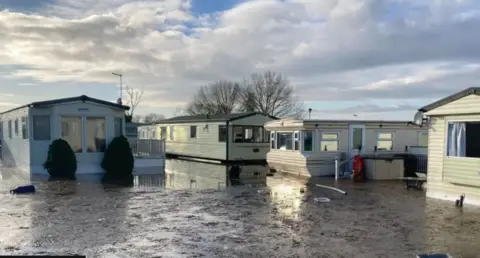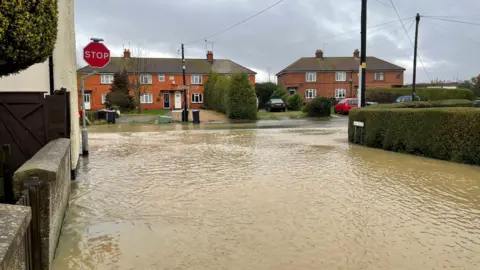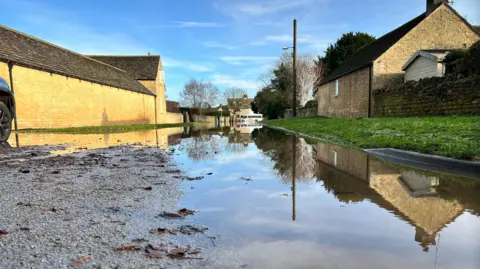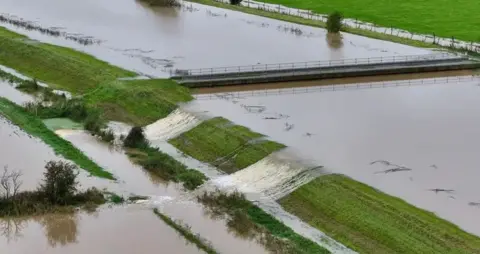Will anyone miss a council flood committee?
 BBC
BBCOn its first day in charge of Lincolnshire County Council Reform UK abolished one of the authority's most important and powerful committees.
The Flood and Water Management Scrutiny Committee oversaw nearly every aspect of flood defence in a county that has been devastated by flooding in recent years.
Despite cross-party pleas to save it, Reform UK's new council leader Sean Matthews said he wanted to save money and "streamline" the authority.
But will scrapping the committee make any difference to the experiences of those who live with the threat of flooding?
How much of a problem is flooding in Lincolnshire?
Forget politics for a second. Let's start with geography.
When it comes to flooding, Lincolnshire is one of the most vulnerable places in Britain; this low-lying region is criss-crossed by a complexity of rivers and drains.
The county also has more than 50 miles (80km) of coastline and nearly all of this needs defending from the North Sea.
Every drop of rainfall that falls on Lincolnshire must be managed. This means either pumping it out to sea via the river and drainage network or diverting water and storing it.
And the flood risks are far from being theoretical. In recent years Lincolnshire has been battered by a succession of powerful weather systems.
Most notably Storm Babet and Storm Henk between October 2023 and February 2024, when 900 homes were flooded and 13 river defences were seriously damaged.
According to the Met Office, this part of the country recorded its wettest ever winter on record, experiencing a month's rain in just a 24 hour period.
What did the committee do?
No one ever lost sleep over the scrapping of council committee, right?
Well, drive through this watery landscape on a rainy November morning and you might see their point.
Conservative councillor Ian Carrington, who sat on the Committee said "it was very unfortunate" that it had been scrapped.
"The committee did not just listen and scrutinise, it took steps to improve the protection that the people of Lincolnshire enjoy from the scourge of flooding", he said.
Defending Lincolnshire from flooding involves a number of public bodies as well as specialist officers from the Council.
These include The Environment Agency, which plays a leading role in protecting people and property.
There are also at least 15 Internal Drainage Boards or IDBs.
These IDBs have specialist local knowledge and operate hundreds of pumping stations, sluices and flood gates.
There are lots of moving parts in a flood defence plan.
The Flood and Water Management Scrutiny Committee was there to try to make them all work together.
It made recommendations, including calls for more government money and it would hold to account the myriad private and public bodies.

Why was it axed?
The Flood and Water Scrutiny Committee met four times a year. It involved at least 18 councillors and dozens of other specialists.
These were drawn from the council itself, from the IDBs, The Environment Agency and private companies such as Anglian Water.
Conservative councillor Ian Carrington said the recent experiences of big storms in Lincolnshire demonstrated the need for the committee: "When you have been through the appalling experiences that many of our local residents have been through, any dilution of our ability to improve the situation has to be deeply worrying." he said.
But Reform UK scrapped the committee on its first day in charge of Lincolnshire County Council.

The new administration said the change would save money and simplify the council.
Reform UK Council leader Sean Matthews, said that flooding will now sit within the Environment Committee, which already deals with issues such as waste and pollution
Mr Matthews said: "I want there to be more meetings about flooding in the county and by moving it under the umbrella of Environment we get to talk about it more." he said.
"We will work longer and harder on flooding than ever before." he added.
Labour group leader Councillor Karen Lee described the change as "Reckless, foolhardy and wrong".

What will the impact be?
As the climate changes, as rain events become more frequent and more severe, it is clear that properties in Lincolnshire are under an increasing threat.
The immediate responses to flooding incidents are unlikely to change in the short term.
There are well-rehearsed protocols between the council, the fire service and the police.
Seasoned professionals who work hard to mitigate the worst of what nature throws at us.
But the longer-term strategies of defence, response and recovery will also need to function effectively; what we learn from flood events, whom we hold to account and where we spend the money to improve protection for communities.
All this against a backdrop of tightening budgets.
 TheDroneman.net
TheDroneman.netEven the government's Environment Secretary Emma Hardy has described the state of the UK's flood defences as being in the 'worst state on record'
Despite resounding criticism from its political rivals Reform UK is arguing that its "simplified" approach will better serve the thousands of vulnerable residents, some of whom look nervously to the skies every time the clouds darken.
Cllr Sean Matthews denied he was watering-down the council's role: "Absolutely not. We were elected on a mandate of reducing waste and simplifying the council, and this [decision] will do that."
Listen to highlights from Lincolnshire on BBC Sounds, watch the latest episode of Look North or tell us about a story you think we should be covering here.
